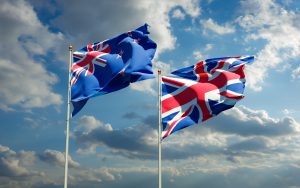The new AUKUS defense pact between Australia, the United Kingdom, and the United States will go down as one of this year’s biggest foreign policy surprises.
By contrast, the announcement of a free trade agreement (FTA) between New Zealand and the United Kingdom was expected – only the exact timing was uncertain. The U.K. signed a particularly generous agreement with Australia in June, and New Zealand’s diplomats were clearly expecting to secure a very similar deal.
Given that AUKUS demonstrated just how close the Australia-U.K. relationship is – not to mention the expected financial windfall to British defense companies from the submarine deal – this expectation might be surprising. While Australia signed its FTA when Prime Minister Scott Morrison was in the U.K. in June – at the same time that the AUKUS deal was reportedly finalized – there has never been any real suggestion that the defense and trade deals were directly linked.
There were clearly some last-minute sticking points between New Zealand and the United Kingdom. In August, both sides publicly signaled that a deal would be signed by the end of that month, which obviously didn’t happen. Nevertheless, the fact that an agreement very much in New Zealand’s favor was imminent was never in real doubt.
For New Zealand’s food exporters, the deal is almost too good to be true. Nearly all tariffs will be eliminated either immediately or over a maximum 15-year period, even in sensitive sectors such as dairy and meat. New Zealand’s wine industry is another big winner.
In return, the U.K. will receive very few direct trade benefits – largely because New Zealand unilaterally removed barriers to most imports during the economic reforms of the 1980s. In fact, a British government analysis found that the deal would at best be only very slightly positive and could even end up reducing the size of the U.K. economy by -0.01 percent of GDP.
Gains to the British economy from the FTA with Australia, while also marginal, were at least predicted to be universally positive.
Why would Prime Minister Boris Johnson sign up the U.K. to what his own government predicts will be a bad deal?
The need to notch up another quick win for his post-Brexit “Global Britain” vision is the most convincing and straightforward explanation. It helps that New Zealand – even more so than Australia – is one of the most pro-free trade countries on earth. But the deal is also part of a wider geopolitical jigsaw puzzle.
In March, Britain announced a “tilt to the Indo-Pacific” in a much-heralded, post-Brexit review of its foreign and defense policy. The Indo-Pacific nomenclature is a short-hand way of referring to the West’s new desire to counter what it sees as China’s own ambitions in Asia and beyond.
The recent high-profile tour of the region by the U.K.’s carrier strike group – including the HMS Queen Elizabeth – was one immediate and very pointed implementation of the new strategy. The unveiling of AUKUS on September 15 came midway through this show of force.
In addition, earlier this month, two ships from the Royal New Zealand Navy – HMNZS Te Kaha and HMNZS Aotearoa – conducted joint exercises with their British counterparts near Guam.
The U.K.’s trade deals complement this military side of the picture.
It is true that the goodwill generated by giving New Zealand an unusually generous agreement will not have any immediate impact on New Zealand’s overarching foreign policy strategy. New Zealand’s general approach is to try and keep on good terms with China – a necessity given the NZ$20 billion in exports it sells to the country every year – while doing just enough to support Western partners that are more skeptical of Beijing.
But the New Zealand-U.K. free trade agreement may mark the beginning of a trade-centered approach by key Western players to show countries like New Zealand that there is a genuine alternative to reliance on China.
The terms of the deal are material to this point. From the New Zealand perspective, the exceptionally good deal makes it easier to start afresh and put to bed the narrative that it was sold down the river when the U.K. joined the Common Market in 1973.
British interest in joining the wider Comprehensive and Progressive Agreement for Trans-Pacific Partnership (CPTPP) deal – an aspiration that will no doubt be assisted by the arrangements now in place with both Australia and New Zealand – would be another next step.
New Zealand’s pending free trade deal with the EU – still a work in progress, but now very much an inevitability – would be a further piece in the puzzle. The EU released its own Indo-Pacific strategy in September, under which the bloc explicitly listed an FTA with New Zealand as a goal.
The strategy explained how the EU was seeking to “deepen its engagement with partners in the Indo-Pacific to respond to emerging dynamics that are affecting regional stability.” By Brussels’ standards, this is plain speaking indeed.
A free trade deal with the United States – which only retreated from the Trans-Pacific Partnership at the last minute, after Donald Trump took office – could be the final part of the jigsaw.
Indeed, it’s not inconceivable that the CPTPP – which began in 2005 as the “P4” deal between New Zealand, Singapore, Brunei, and Chile – could eventually end up as a Western-led bloc that includes the U.K., EU, and U.S. as well as the original member countries around the Pacific Rim.
This possibility explains why China submitted its own application to join the CPTPP the day after the AUKUS deal was announced.
For now, New Zealand’s free trade deal with the U.K. might be about building back better – but it could end up being more about Beijing.
This article was originally published by the Democracy Project, which aims to enhance New Zealand democracy and public life by promoting critical thinking, analysis, debate, and engagement on politics and society.

































